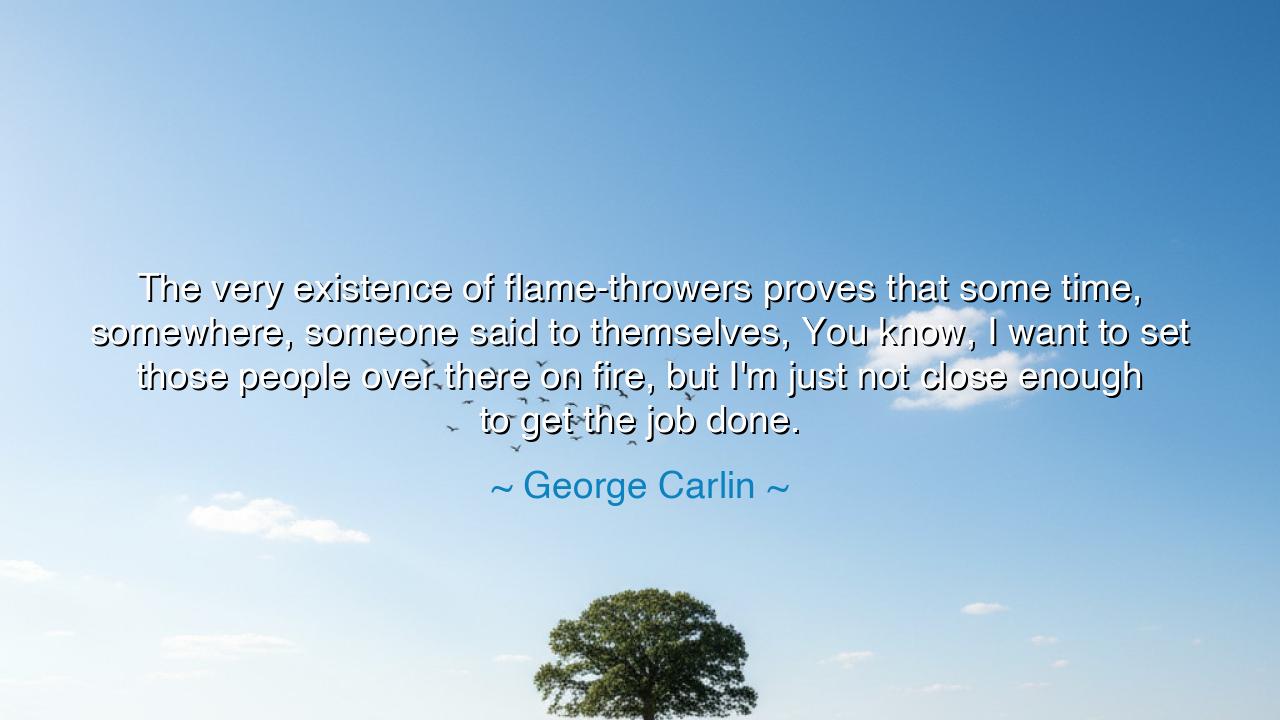
The very existence of flame-throwers proves that some time
The very existence of flame-throwers proves that some time, somewhere, someone said to themselves, You know, I want to set those people over there on fire, but I'm just not close enough to get the job done.






The words of George Carlin, “The very existence of flame-throwers proves that some time, somewhere, someone said to themselves, ‘You know, I want to set those people over there on fire, but I’m just not close enough to get the job done,’” are clothed in humor, yet they pierce with a blade of truth. Carlin, a master of satire, used laughter to strip away illusions, revealing the absurdity of human invention when twisted by violence and destruction. His words remind us that behind every weapon lies a thought, behind every instrument of war lies the dark imagination of man.
At its heart, this quote is not about flame-throwers alone, but about the nature of human ingenuity. The mind of man is capable of astonishing creativity, of building bridges, healing diseases, and reaching the stars. Yet, it is also capable of bending that same creativity toward cruelty. The very fact that such a weapon exists tells us that intelligence alone is not wisdom; for wisdom seeks to preserve life, while folly seeks to destroy it more efficiently. Carlin’s jest is a mirror, forcing us to see how easily brilliance can be corrupted by hatred.
The origin of flame-throwers is tied to war itself, most notably in the First and Second World Wars. Invented as a weapon to clear trenches and bunkers, it became a tool of terror as much as of strategy. The German army first employed it in World War I, and it spread to other nations in the conflicts that followed. Soldiers who wielded them carried not only fire but the weight of knowing they were instruments of one of the most feared forms of death. Here history confirms Carlin’s satire: someone, somewhere, decided that ordinary weapons were not enough—that they needed fire to reach farther.
This truth is not confined to the battlefield. It reveals something fundamental about the human condition: that our greatest danger is not lack of power, but how we choose to use it. The creation of the flame-thrower, like the nuclear bomb or the chemical weapon, testifies that man’s imagination is limitless, but his morality often lags behind. Carlin’s words force us to confront this imbalance, not with dry philosophy, but with the sting of laughter that lingers into reflection.
And yet, there is also a hopeful lesson hidden within the darkness. If man’s creativity can produce such horrors, it can also produce wonders. The same ingenuity that crafted weapons has also given rise to vaccines, to poetry, to art, to the internet that binds us together. The challenge is not to stifle creativity, but to guide it, to bind it with conscience, to aim it toward light instead of shadow. For invention without morality is chaos; invention guided by compassion is salvation.
For those who seek wisdom, take this as guidance: when you see a new tool, a new invention, or even a new idea, ask not only, “Can this be done?” but “Should this be done?” Ask whether it uplifts or destroys, whether it binds men together or sets them further apart. Carlin’s jest warns us of what happens when the question of morality is left unasked—when imagination runs free without the reins of justice.
The practical action is this: be vigilant with your own creativity and your own power, however small it may seem. Do not allow bitterness or anger to guide your talents, lest you build weapons instead of bridges. Support the work that seeks to heal and resist the work that seeks only to destroy. For the weapons of hatred begin not in factories, but in the imagination of men—and it is there that they must be confronted first.
Thus let Carlin’s words endure not merely as comedy, but as a warning written in jest. The existence of the flame-thrower reveals both the brilliance and the madness of man. May we learn from it that the mind without conscience is dangerous, but the mind bound to wisdom can shape a future of light. And may we pass down to generations yet unborn the teaching that every invention, every idea, must be judged not by its cleverness alone, but by whether it serves the cause of life or the cause of death.






AAdministratorAdministrator
Welcome, honored guests. Please leave a comment, we will respond soon